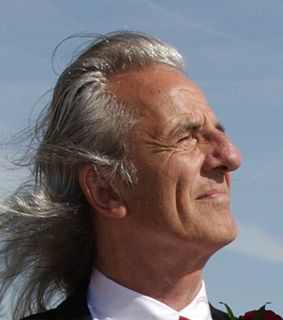
China Tom Miéville is a British speculative fiction author, essayist, comic book writer, socialist political activist, and literary critic. He often describes his work as weird fiction and is allied to the loosely associated movement of writers called New Weird.

Alexander Theodore Callinicos is a Rhodesian-born British political theorist and activist. An adherent of Trotskyism, he is a member of the Central Committee of the Socialist Workers Party (SWP) and serves as its International Secretary. He is also editor of International Socialism, the SWP's theoretical journal, and has published a number of books.

Marxism is a left-wing to far-left method of socioeconomic analysis that uses a materialist interpretation of historical development, better known as historical materialism, to understand class relations and social conflict and a dialectical perspective to view social transformation. It originates from the works of 19th-century German philosophers Karl Marx and Friedrich Engels. As Marxism has developed over time into various branches and schools of thought, no single, definitive Marxist theory exists.

John Bellamy Foster is an American professor of sociology at the University of Oregon and editor of the Monthly Review. He writes about political economy of capitalism and economic crisis, ecology and ecological crisis, and Marxist theory. He has given numerous interviews, talks, and invited lectures, as well as written invited commentary, articles, and books on the subject.

Michael Burawoy is a sociologist working within Marxist social theory, best known as the leading proponent of public sociology and the author of Manufacturing Consent: Changes in the Labor Process Under Monopoly Capitalism—a study on the sociology of industry that has been translated into a number of languages.

Richard David Wolff is an American Marxian economist, known for his work on economic methodology and class analysis. He is Professor Emeritus of Economics at the University of Massachusetts Amherst, and currently a Visiting Professor in the Graduate Program in International Affairs of the New School in New York. Wolff has also taught economics at Yale University, City University of New York, University of Utah, University of Paris I (Sorbonne), and The Brecht Forum in New York City.
Communism is a far-left sociopolitical, philosophical, and economic ideology and current within the socialist movement whose goal is the establishment of a communist society, namely a socioeconomic order centered around common ownership of the means of production, distribution, and exchange—allocating products to everyone in the society. It also involves the absence of social classes, money, and the state. Communists often seek a voluntary state of self-governance, but disagree on the means to this end. This reflects a distinction between a more libertarian approach of communization, revolutionary spontaneity, and workers' self-management, and a more vanguardist or communist party-driven approach through the development of a constitutional socialist state followed by Friedrich Engels' withering away of the state.

David Stanley Hill is a British Marxist politician, academic and educational activist. He is Research Professor (Emeritus) in Education at Anglia Ruskin University, Chelmsford, England, and also Visiting Professor at the National and Kapodistrian University of Athens, Greece, and in the Social Policy Research Centre at Middlesex University, London. He was an elected Labour Party councillor for East Sussex County Council and Brighton Borough Council in the 1970s and 1980s and has been a candidate in thirteen local, national and European elections since 1972, most recently as Parliamentary Candidate in Hove and Portslade in the 2015 general election for the Trade Unionist and Socialist Coalition (TUSC). In Britain he is currently a member of the Labour Left Alliance and Anti-Capitalist Resistance, the British section of and the Fourth International.
Kim Moody is an American-born writer on labor who advocates social movement unionism, a revitalized labor movement of mobilized and militant rank-and-file workers, rather than business unionism, structured from the top down and compromised by coziness with corporations.
Christian Lotz is a German-American philosopher currently teaching at Michigan State University. Lotz's work primarily focuses on 19th and 20th Century European philosophy, continental aesthetics, critical theory, Marxism, and contemporary European political philosophy.
Samuel Farber is an American writer born and raised in Cuba.
Cultural studies is an interdisciplinary field that examines the political dynamics of contemporary culture and its historical foundations. Cultural studies researchers generally investigate how cultural practices relate to wider systems of power associated with, or operating through, social phenomena. These include ideology, class structures, national formations, ethnicity, sexual orientation, gender, and generation. Employing cultural analysis, cultural studies views cultures not as fixed, bounded, stable, and discrete entities, but rather as constantly interacting and changing sets of practices and processes. The field of cultural studies encompasses a range of theoretical and methodological perspectives and practices. Although distinct from the discipline of cultural anthropology and the interdisciplinary field of ethnic studies, cultural studies draws upon and has contributed to each of these fields.
David North is an American Marxist theoretician. He is the national chairman of the Socialist Equality Party in the United States (SEP), formerly the Workers League. He served as the national secretary of the SEP until the party's congress in 2008. North was the principal political and theoretical leader of the International Committee of the Fourth International during the organization's split with the Workers Revolutionary Party in Britain.
Paul Le Blanc is an American historian at La Roche University in Pittsburgh as well as labor and socialist activist who has written or edited more than 30 books on topics such as Leon Trotsky and Rosa Luxemburg.

Neo-Marxism is a Marxist school of thought encompassing 20th-century approaches that amend or extend Marxism and Marxist theory, typically by incorporating elements from other intellectual traditions such as critical theory, psychoanalysis, or existentialism.

Orthodox Marxism is the body of Marxist thought that emerged after the death of Karl Marx (1818–1883) and which became the official philosophy of the majority of the socialist movement as represented in the Second International until the First World War in 1914. Orthodox Marxism aims to simplify, codify and systematize Marxist method and theory by clarifying the perceived ambiguities and contradictions of classical Marxism.

Western Marxism is a current of Marxist theory that arose from Western and Central Europe in the aftermath of the 1917 October Revolution in Russia and the ascent of Leninism. The term denotes a loose collection of theorists who advanced an interpretation of Marxism distinct from both classical and Orthodox Marxism and the Marxism-Leninism of the Soviet Union.
Crisis theory, concerning the causes and consequences of the tendency for the rate of profit to fall in a capitalist system, is associated with Marxian critique of political economy, and was further popularised through Marxist economics.

Vivek Aslam Chibber is an American academic, social theorist, editor, and professor of sociology at New York University, who has published widely on development, social theory, and politics. Chibber is the author of three books, The Class Matrix: Social Theory after the Cultural Turn, Postcolonial Theory and the Specter of Capital and Locked in Place: State-Building and Late Industrialization in India.

Kevin B. Anderson is an American sociologist, Marxist humanist, author, and professor. Anderson is Professor of Sociology, Political Science and Feminist studies at University of California, Santa Barbara (UCSB). He was previously Professor of Sociology at Northern Illinois University, in DeKalb and Professor of Political Science, Sociology and Women's Studies at Purdue University.









